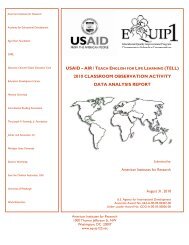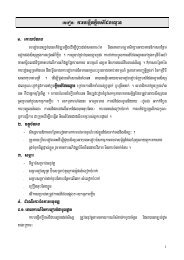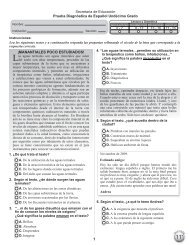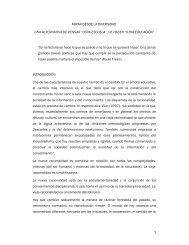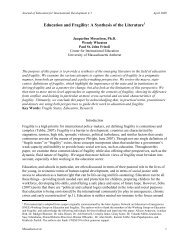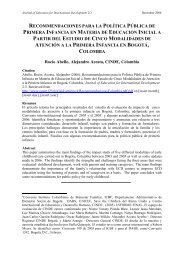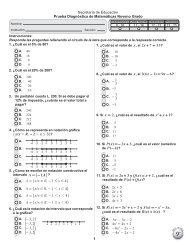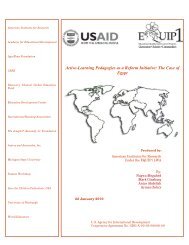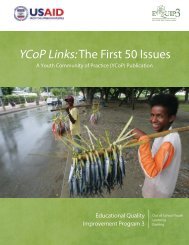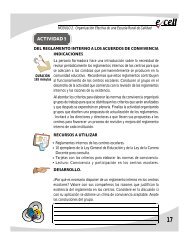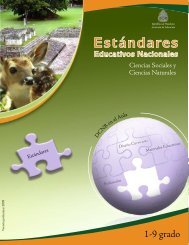The Power of Persistence: Education System ... - EQUIP123.net
The Power of Persistence: Education System ... - EQUIP123.net
The Power of Persistence: Education System ... - EQUIP123.net
You also want an ePaper? Increase the reach of your titles
YUMPU automatically turns print PDFs into web optimized ePapers that Google loves.
Nicaragua: Summary<br />
COUNTRy CONTExT<br />
In Nicaragua, the divisions from the civil conflict in the 1980s have continued to<br />
influence the policies and practice <strong>of</strong> education reform. Without the consistency<br />
<strong>of</strong> strong educational leadership and a national vision, Nicaragua’s progress is<br />
more sporadic and dependent on the continuity <strong>of</strong> donor support. Dramatic<br />
reforms like autonomous schools are still playing out in the national debates.<br />
Despite these challenges, demonstrably effective Active Schools (Escuelas Activas<br />
or EA) reforms have been continuously supported by successive governments and<br />
ministers, and have survived even the transition from a Liberal to a Sandinista<br />
government. A review <strong>of</strong> the reforms that occurred under the administrations<br />
during the last 20 years illustrates how the implementation <strong>of</strong> successful<br />
programs underlay the subsequent policy framework, and how ultimately the<br />
continuity <strong>of</strong> programs garnered and hinged on local and international support.<br />
REFORM gOALS<br />
In general, the goals <strong>of</strong> the Ministry <strong>of</strong> <strong>Education</strong> (MINED) 1 have fluctuated with<br />
political administration, a trend obvious in the transition from the Sandinista<br />
National Liberation Front (FSLN) to Violeta Chamorro’s administrations and<br />
the National Opposition Union party (UNO). At the time, the Ministry <strong>of</strong><br />
<strong>Education</strong> did not have a coherent vision for education, or stable and consistent<br />
staff. Rather the early reform initiatives were promoted and dependent on a<br />
few key personalities (ministers or certain strong figures within MINED), the<br />
most notable being Humberto Belli, Minister <strong>of</strong> <strong>Education</strong> in the Chamorro<br />
and Alemán administrations. Ideologically, the MECD under Belli valued<br />
individualistic goals and individual moral responsibility, as opposed to the<br />
collective and mass participatory ideals <strong>of</strong> education under the FSLN (Gershberg,<br />
2002). Nicaragua, with support from international donors, engaged in widespread<br />
1 <strong>The</strong> current government, elected in 2007 uses the acronym MINED. Under the prior governments the<br />
Ministry was the Ministry <strong>of</strong> <strong>Education</strong>, Culture, and Sports, the MECD.<br />
SECTION 2: lESSONS fROM COUNTRY CASE STUdIES<br />
99



